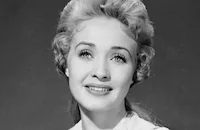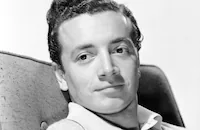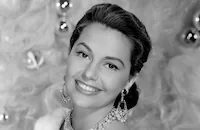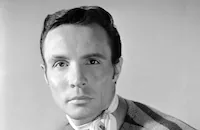Deep in My Heart

Brief Synopsis
Cast & Crew
Stanley Donen
Jose Ferrer
Merle Oberon
Helen Traubel
Doe Avedon
Walter Pidgeon
Film Details
Technical Specs

Synopsis
In the years before the first World War, young Hungarian composer Sigmund Romberg goes to his job as a musician at New York's Café Vienna, which is owned by the good-hearted Anna Mueller. A slick music promoter, Berrison, comes in and listens to Anna sing one of Sigmund's songs, but dismisses the composer's work as old-fashioned "Viennese oom-pah-pah." Sigmund takes Berrison's challenge and tries his hand at a ragtime number, "Leg of Mutton," which quickly becomes a hit and gains the attention of theater impresario J. J. Shubert. Encouraged by actress Dorothy Donnelly, who is quick to recognize Sigmund's talent, Shubert buys a song for the first act finale of his new Broadway show starring Gaby Deslys.
On opening night, Sigmund waits eagerly to hear his composition, but is angry to find that his lovely ballad has been turned into a gaudy production number. Shubert and his associate, Bert Townsend, offer Sigmund a five-year contract but refuse to grant him artistic control over his work. After demonstrating with Anna how his song should have been sung, Sigmund proudly rejects the offer. When Dorothy privately urges him to sign the contract in order to establish a name for himself, however, Sigmund agrees. Sigmund churns out a string of commercial hits for Shubert, and despite his artistic frustration quickly becomes accustomed to material success. After Sigmund repeatedly begs Townsend to consider producing his operetta Maytime , Dorothy comes up with a scheme to get the Shubert organization's attention. Dorothy takes Sigmund to lunch at a fashionable restaurant where Shubert and his associates regularly dine, and leads him to producer Florenz Ziegfeld's table. From across the room, Shubert watches uneasily as Dorothy hands a copy of the operetta to Ziegfeld, who has agreed to go along with their ruse.
Although he sees through their game, Shubert finally agrees to produce the show, and Maytime is a huge success, elevating Sigmund to true celebrity status. Determined to maintain artistic control, Sigmund produces his next show himself and loses most of his money. Humbled, Sigmund offers his services to Shubert and Townsend, who warmly welcome him back and assign him to a new project with a short deadline. Sigmund and writers Ben Judson and Harold Butterfield are sent to a mountain lodge to devote themselves exclusively to work. One day, Sigmund has ventured out for a walk when he encounters pretty Lillian Harris and her mother, who mistake the unkempt composer for a tramp and pay him a dollar to fix their flat tire. Later, Sigmund meets Lillian at the lodge, and she is surprised to learn that he is the famous composer.
Sigmund quickly falls in love with Lillian, but fails to impress her mother, who considers him vulgar. Lillian at last responds to Sigmund's protestations of love with a kiss, and the following morning he sends her a bunch of violets. However, Townsend has mischievously sent violets "from Sigmund" to every woman at the lodge, and the angry Lillian parts ways with the composer. A year later, Dorothy, who has secretly been in love with Sigmund for years, tells him she has been adapting a German play into a libretto called The Student Prince and would like him to write the score. Sigmund is still morose over Lillian, however, and decides to depart for Europe after the opening of his new show, Artists and Models . Lillian attends opening night with a date, Cumberly, and Anna spots her in the lobby and invites her to a party at the café. Sigmund is stunned when Lillian appears at the party, and again declares his love for her, but she insists that a relationship between them would not work.
After Lillian and Cumberly leave, Sigmund, roused from his torpor, declares that he will throw himself into work on The Student Prince . After that operetta's triumphant opening night, Lillian appears before Sigmund in the empty theater and expresses her admiration and love. Sigmund and Lillian are married, and his career continues to flourish. Years later, Dorothy is too ill to attend the opening night of their latest collaboration, My Maryland , and Lillian and Anna spend the evening with her. Sigmund comes in full of plans for their next show, but Dorothy gently says goodbye to her friends, and dies several weeks later. Sigmund is heartbroken at the loss of his partner, but at Lillian's urging, goes to work on a new show with Oscar Hammerstein II, the smash hit New Moon . Sigmund's next few shows fail to catch on, however, and after another unsuccessful opening, Lillian tells her husband she wants to hear him conducting his own music at Carnegie Hall. Sigmund's Carnegie Hall concert, featuring a full symphony orchestra, is a success, and the composer concludes with a loving tribute to his wife.

Director

Stanley Donen
Cast

Jose Ferrer

Merle Oberon

Helen Traubel

Doe Avedon

Walter Pidgeon

Paul Henreid

Tamara Toumanova

Paul Stewart

Isobel Elsom

David Burns

Jim Backus

Rosemary Clooney

Gene Kelly
Fred Kelly

Jane Powell

Vic Damone

Ann Miller
William Olvis

Cyd Charisse

James Mitchell

Howard Keel

Tony Martin

Joan Weldon

Douglas Fowley
Robert Easton
Susan Luckey

Russ Tamblyn

Ludwig Stossel
Elsie Neft
Norbert Schiller
Torben Meyer

Henri Letondal
Lane Nakano

John Alvin
Jean Vander Pyl
Mary Alan Hokanson
Henry Sylvester

Bob Carson
Robert Watson
Marjorie Liszt
Gail Bonney
Jean Dante
Gordon Wynne
Mitchell Kowall
Joe Roach
Dee Turnell
Reuben Wendorff
Laiola Wendorff
Franz Roehn
Maudie Prickett
Dulce Daye
Margaret Bacon
Gloria Moore
Lulumae Bohrman
Richard Beavers
Tailor Boswell
Crew
R. Harold Atteridge
James Brock
Alexander Courage
Adolph Deutsch
Dorothy Donnelly
Roger Edens
Roger Edens
Alvord Eiseman
Adrienne Fazan
George Folsey
Hugo Friedhofer
Alex Gerber
Cedric Gibbons
Sydney Guilaroff
Ed Haight
Oscar Hammerstein Ii
Otto Harbach
Harold Humbrock
Arthur Krams
John Logan
Eugene Loring
Ballard Macdonald
Wesley C. Miller
Warren Newcombe
Ernest Newton
Walter Plunkett
Herbert Reynolds
Carol Richards
Sigmund Romberg
Helen Rose
Leonard Spigelgass
Robert Tucker
William Tuttle
Robert Vreeland
Betty Wand
Edwin B. Willis
Cyrus Wood
Rida Johnson Young

Videos
Movie Clip




Trailer
Hosted Intro
Film Details
Technical Specs

Articles
Deep in My Heart
Edens had served for many years as famed producer Arthur Freed's right-hand man, writing lyrics and music, arranging songs and supervising productions as needed. He had even won three Oscars® along the way. Deep in My Heart was Edens's first shot at producing a film alone and was to be another in a then-popular musical subgenre: the composer biopic. The subject was Sigmund Romberg, one of the biggest forces in American musical theater from the 1920s on.
Born in Hungary, Romberg migrated to America in 1909 at age 20. He steadily went from playing piano in restaurants to leading small orchestras to writing for vaudeville to composing hit shows of his own, which were sentimental, schmaltzy and hugely successful. Maytime, for instance, was so popular that for the only time in Broadway history two theater companies put the show on simultaneously - an event captured in the movie. In all, Romberg wrote some 2000 songs and composed 80 musical comedies, revues and operettas, the most famous of which are Maytime, The Student Prince, The Desert Song, New Moon, and Up in Central Park. All of those, incidentally, were made into movies themselves, some more than once. Romberg died in 1951.
Romberg's life got the movie treatment because other composer biographies had lately performed well - films like Till the Clouds Roll By (1946 - Jerome Kern), Night and Day (1946 - Cole Porter), Words and Music (1948 - Rodgers and Hart), and Three Little Words (1950 - Kalmar and Ruby). The problem was that they tended to be little more than revues of hit songs strung together by the most threadbare of plots - not exactly enticing material for a filmmaker. Donen said that even Edens wasn't too thrilled with the project: "Had the choice been his, I don't think Roger would have selected the life of Romberg. But he felt that as a first-time producer, he should do something that would be a success."
Helping matters greatly was an all-star lineup of guest "specialty" performers including Gene Kelly, Ann Miller, Cyd Charisse, Howard Keel, Jane Powell, Rosemary Clooney and Tony Martin. The main cast was equally impressive: Jose Ferrer as Romberg, with support from Merle Oberon, Walter Pidgeon, Paul Henreid and famed American opera star Helen Traubel. Deep in My Heart marked Jose Ferrer's only singing role. Donen said, "Jose was my choice. He loved doing it. He studied singing all his life."
In structuring the movie, Donen recalled, "We didn't mind changing the songs' original contexts. We weren't trying to make a documentary; we wouldn't have known how. As Arthur Loew, Jr. said back during the '50s: 'Here at Metro, they think a documentary's a picture with only two musical numbers.'" Deep in My Heart has plenty, with highlights including "Lover Come Back to Me," "Softly, As in a Morning Sunrise," "Serenade," "It" (with a spectacular Ann Miller dance), "One Alone" (with Cyd Charisse and James Mitchell in a sensual ballet), and "Mr. and Mrs.," in which Ferrer and Rosemary Clooney perform a duet. (The two had recently married in real life.) Another impressive number is "Jazzado," in which Ferrer frantically runs through an entire show he is composing in six minutes, playing all the parts. The musical collage features amazing arranging work by Edens.
The most notable sequence, however, involves Gene Kelly and his brother Fred in Fred's only screen appearance. Fred Kelly was actually considered the dancer of the family as a teenager, and the most likely to make a living from dancing. While that prediction obviously turned out to be false, Fred was certainly talented, as this number reveals. It's called "I Love to Go Swimmin' with Women" and was written by Romberg for his 1921 Love Birds, though it was ultimately cut from that show. (The movie mis-identifies it as being from the 1914 show Dancing Around). The Kelly brothers play a fictional vaudeville team named the O'Brien Brothers, and as film historian Jeanine Basinger has written (in Gene Kelly), "they leap and twist and clown and hoof up a storm. Watching them is almost as close as a modern viewer can get to seeing and hearing what a real vaudeville show might have been like."
Basinger also notes that in "looking at Kelly's brother, one begins to understand what movie star charisma is all about. Fred is handsome, talented, and can dance. But his face has an ordinary quality, while his brother (who looks much like him) has that extra added something that marks the star - the added definition of on-camera character."
The Legion of Decency declared Deep in My Heart "Morally Objectionable In Part For All" - unheard-of for a musical - due to its suggestive costuming and dancing. That didn't stop it from becoming a big Christmas-time hit.
Producer: Roger Edens
Director: Stanley Donen
Screenplay: Elliott Arnold (book), Leonard Spigelgass
Cinematography: George J. Folsey
Film Editing: Adrienne Fazan
Art Direction: Edward C. Carfagno, Cedric Gibbons
Music: Sigmund Romberg
Cast: Jose Ferrer (Sigmund Romberg), Merle Oberon (Dorothy Donnelly), Helen Traubel (Anna Mueller), Doe Avedon (Lillian Romberg), Walter Pidgeon (J. J. Shubert), Paul Henreid (Florenz Ziegfeld).
C-132m. Letterboxed. Closed captioning.
by Jeremy Arnold

Deep in My Heart
TCM Remembers Howard Keel this Monday, Nov. 15th
PLEASE NOTE SCHEDULE CHANGE
6:00 AM
Callaway Went Thataway (1951)
7:30 AM
Ride, Vaquero! (1953)
9:30 AM
War Wagon (1967)
11:30 AM
"MGM Parade Show #14"
(Keel talks with George Murphy about his latest MGM picture "Kismet")(1955)
12:00 PM
Showboat (1951)
2:00 PM
Kiss Me Kate (1953)
4:00 PM
Seven Brides for Seven Brothers (1954)
6:00 PM
Kismet (1955)
HOWARD KEEL (1919-2004):
Howard Keel, the strapping singer and actor whose glorious baritone took him to stardom in the early '50s in some of MGM's best musicals, including Showboat, Kiss Me Kate and Seven Brides for Seven Brothers, died on November 7 of colon cancer at his home in Palm Desert, California. He was 85.
He was born Harry Clifford Leek on April 13, 1919, in Gillespie, Illinois. His father, was a coal miner and his mother, a strict Methodist, forbid the children from enjoying popular entertainments. When his dad died, his mother relocated the family to California when Harry was still a young teenager.
After he graduated high school, Keel had a brief stint as a singing busboy, but had not considered a professional career as a vocalist....until one fateful evening in 1939. It was at this time he saw celebrated opera singer, Lawrence Tibbett, at the Hollywood Bowl. Keel was inspired, and he soon began taking voice lessons. Over the next several years, he carefully trained his voice while entering any singing contest he could find. It wasn't long before his talents caught the attention of Rodgers & Hammerstein.
In 1946, they signed him to replace John Raitt in the Broadway production of Carousel, changed his name to Howard Keel (His proper surname Leek spelled backwards), and Keel was on his way to international stardom.
After his run in Carousel ended, he sailed to London the following year to play the role of Curley in Rodgers & Hammerstein's Oklahoma. He received rave reviews from the London press, and by the time he returned to the United States in 1948, he was ready to make his move into films.
Keel made his movie debut in the British thriller, The Small Voice (1948), but it would be his second film, and first for MGM, portraying Frank Butler, Betty Hutton's leading man in Annie Get Your Gun (1950), that sealed his success. Keel's several strengths as a performer: his supple, commanding singing voice; his athletic, 6'4" frame; striking, "matinee-idol" good looks; and his good humored personality made him one of the studios' top leading men over the next few years. Indeed, between 1951-55, Keel could do not wrong with the material he was given: Show Boat (1951), Lovely to Look at (1952), Kiss Me Kate (1953), Seven Brides for Seven Brothers (1954), and Kismet (1955). Clearly, he was a shining star in this golden era of the MGM musical.
By the late '50s, movie musicals began to fade out of fashion, but Keel returned to the stage and had success performing with several touring companies. He made a brief return to films when he was cast as a seaman battling carnivorous plants from outer space in the popular British sci-fi hit, The Day of the Triffids (1962). Television also provided some work, where he guest starred in some of the more popular shows in the late '60s including Run For Your Life, and The Lucy Show.
Keel would keep a low profile over the next decade, but he made an amazing comeback in 1981, when he was cast as Clayton Farlow, Ellie Ewing's (Barbara Bel Geddes) second husband in the wildly successful prime time soap, Dallas. Not only did he play the role for ten seasons, but Keel would also be in demand for many other shows throughout the '80s and '90s: The Love Boat, Fantasy Island, Murder, She Wrote, Hart to Hart, and Walker, Texas Ranger, to name a but a few. By the late-'90s, Keel retired to his home in Palm Desert, California, where still made public appearances now and again for a tribute or benefit. He is survived by his wife of 34 years, Judy; a son, Gunnar; daughters, Kaija, Kristina and Leslie; 10 grandchildren, and one great-granddaughter.
by Michael T. Toole
Important Milestones on Howard Keel:
1933:
Moved to Southern California at age 16 (date approximate)
Worked as a singing busboy in a Los Angeles cafe
Worked for Douglas Aircraft as a manufacturing representative travelling among various company plants; work included singing; won a first prize award at the Mississippi Valley while on the road; also won an award at the Chicago Music Festival
Began singing career with the American Music Theatre in Pasadena, California
Chosen by Oscar Hammerstein II to perform on Broadway in "Carousel"; succeeded John Raitt in the leading role of Billy Bigelow; also took over the leading role of Curly in "Oklahoma"
1947:
Recreated the role of Curly when he opened the London stage production of "Oklahoma"
1948:
Made feature film debut in a non-singing supporting role in the British crime drama, "The Small Voice"
1950:
Signed by MGM; became instant star as the male lead of "Annie Get Your Gun"
1951:
Provided the offscreen narration for the Western saga, "Across the Wide Missouri", starring Clark Gable
1951:
First film opposite Kathryn Grayson, "Show Boat"
1952:
First leading role in a non-musical, "Desperate Search"
1954:
Made best-remembered film, "Seven Brides for Seven Brothers"
1955:
Last musical starring roles, and last musicals for MGM, "Jupiter's Darling" and "Kismet"
1958:
Went to Britain to play the leading role in the action drama, "Floods of Fear"
1967:
Last leading role, "Red Tomahawk"
1968:
Last feature film appearance for over 20 years, "Arizona Bushwhackers"
Starred on the London stage in the musical "Ambassador"; later brought the role to Broadway (date approximate)
Toured the nightclub circuit, sometimes teaming up with his co-star from three MGM musicals of the 1950s, Kathryn Grayson
Toured in stage productions of musicals and comedies including "Camelot", "Man of La Mancha", "Paint Your Wagon", "I Do! I Do!", "Plaza Suite", "Gigi", "Show Boat", "Kismet", "The Most Happy Fella" and "The Fantasticks"
1977:
Teamed with Jane Powell on record-breaking national theater tour of "South Pacific"
1978:
Reprised screen role of eldest brother Adam in a touring stage version of "Seven Brides for Seven Brothers", opposite original screen co-star Jane Powell
Joined the cast of the CBS primetime serial drama, "Dallas", which had premiered in 1978; played Clayton Farlow
1983:
Recorded first solo album, "And I Love You So"
1994:
Was one of the hosts of the feature compilation documentary, "That's Entertainment III", revisiting the MGM musical from the coming of sound through the late 1950s
Keel was President of the Screen Actors Guild from 1958-1959.
TCM Remembers Howard Keel this Monday, Nov. 15th PLEASE NOTE SCHEDULE CHANGE
Quotes
Trivia
The costumes in the "It" number were recycled from the "Beautiful Girls" number in Singin' in the Rain (1952).
Notes
The working title of this film was The Romberg Story. The opening credits include the following written dedication: "To all those who love the music of Sigmund Romberg." Romberg (1887-1951) was born in Szeged, Hungary and emigrated to the United States in 1909. The prolific composer's work combined elements of Viennese operetta and American popular music, with great success. In addition to the songs listed, passages from Romberg's other compositions were used as background music throughout the film. The second half of the film includes voice-over narration by Doe Avedon as "Lillian Romberg."
According to pre-production news items in Hollywood Reporter and Variety, Arthur Freed was originally assigned to produce the film, with Roger Edens serving as associate producer. Instead, Deep in My Heart became Edens' first solo producing credit. A August 27, 1953 Hollywood Reporter news item reported that Joseph Fields would collaborate with Leonard Spigelgass on the screenplay, but the extent of his contribution to the final film has not been determined. According to a modern source, Fields completed a screenplay about Romberg for Freed in 1951, but when Edens took over the production, he assigned Spigelgass to rewrite it. A May 5, 1950 Daily Variety news item reported that Romberg would portray himself in the picture, marking the first time a living composer had appeared in a film based on his life, but Romberg died before production began. In October 1953, an Hollywood Reporter news item stated that Charles Walters would direct the film.
Hollywood Reporter and Daily Variety news items from March-May 1954 provide the following casting information: Kurt Kasznar was originally cast as Romberg, Louis Calhern as "Florenz Ziegfeld" and Donna Reed as Lillian. However, Reed had to withdraw from the production because of her role in The Last Time I Saw Paris . Lana Turner was announced for the role of "Gaby Deslys," and an item in Hollywood Reporter's "Rambling Reporter" column announced that both Linda Christian and Eva Gabor were being considered for the part. A news item adds Gertrude Astor to the cast, but her appearance in the final film has not been confirmed. Hollywood Reporter production charts and news items include Esther Williams, Vera-Ellen, George Murphy and Keenan Wynn in the cast, but they did not appear in the film.
A number of Romberg's operettas were made into films, including the M-G-M films Maytime (1937) and New Moon (1940), both of which were directed by Robert Z. Leonard and starred Jeanette MacDonald and Nelson Eddy (see AFI Catalog of Feature Films, 1931-40), and the 1953 M-G-M film The Student Prince . José Ferrer and singer Rosemary Clooney were married at the time of production, and Deep in My Heart marks their only screen appearance together, as well as being Ferrer's only singing role. The film also features Gene Kelly's only onscreen appearance with his brother Fred.

Miscellaneous Notes
Released in United States December 1954
Released in United States Winter January 1, 1954
Released in United States Winter January 1, 1954
Released in United States December 1954















